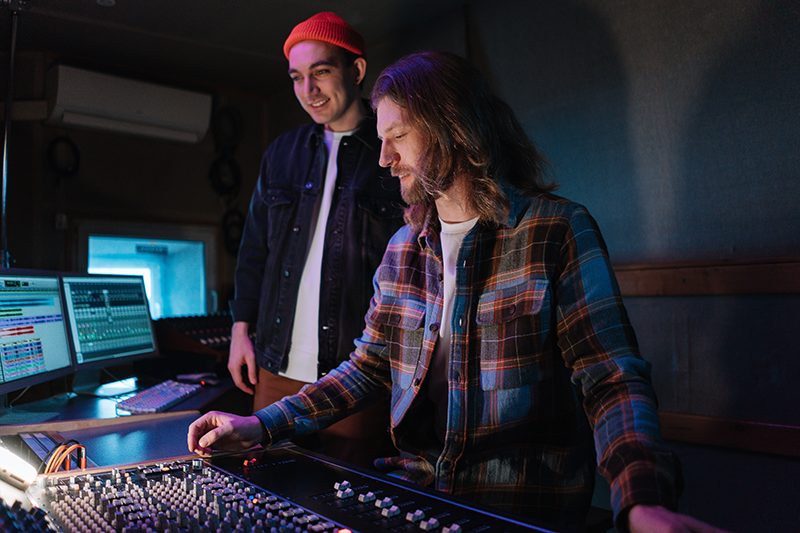
As a budding artist, it’s easy to become overwhelmed. After all, the modern musician wears many hats as producer, singer, songwriter, promoter, manager, and then some. Whatever roles you play for your own artist project, taking care of your mental health and well-being needs to come first.
Thankfully, there are several ways to keep your self-care in check as a musician. Below, we’ll share some of the best ways to beat burnout as an artist and overcome your stress as a musician – not just during Mental Health Awareness Month but all year long.

1. Take a break before stepping into the studio.
When it comes to making good music, your mental health and well-being come first. A stressed brain can’t express with the same clarity as a relaxed one, so take the time to center yourself before heading into a session.
This could mean stepping away for a five-minute meditation or deliberately scheduling your yoga class right before you track vocals. Taking time to check in with yourself isn’t just a great mental health practice, it can also help you perform better while you’re on the mic.
2. Practice essential self-care.
It sounds simple, but so many of us neglect basic self-care principles that have a huge effect on our clarity and creativity. Make sure you’re prioritizing sleep, drinking lots of water, and sticking to a balanced diet as much as possible.
It’s also good to get in some exercise or movement every day, even if it boils down to taking a quick step away from your session. Pay attention to your body’s needs and don’t neglect them to be more “productive.” When we feel our best, we’re at our best, so tending to your needs paves the way for your next greatest work.
3. Step away from your songs.
You’ll want to step away from your music for yourself and for the sake of your sound. “Ear fatigue” is real!As humans, we naturally adapt to the sounds around us fairly quickly, so spending too long in a session can lead you to lose perspective while creating. Take regular breaks away from your current project, but make a point of scheduling your return so that you’re motivated to finish the project once you’re fully refreshed.
4. Spend time with your loved ones.
Without input, there’s no output. If you don’t take time to experience life outside of music, you won’t have anything to express in your music. So, take it upon yourself to prioritize seeing those you love. It may seem counterintuitive, but making space for life outside of music is bound to help your music.
It’s also all too easy for artists to conflate their sense of self-esteem with the success of their music. Don’t forget that you are much more complex than what you create. Tend to your needs outside of music for your music.

5. Express your creativity in new ways.
If you feel called to channel your creativity in mediums outside of music, do so! Expressing yourself in other mediums can help inspire new ideas for your music while giving you a necessary break from your main outlet.
Feel free to experiment with painting, drawing, dancing, pottery, or allowing yourself to critically listen to genres you usually avoid. Sometimes taking a step from your usual routine can be just what you need to come back with a fresh perspective on your current project.
6. Create realistic goals.
A lot of stress can stem from unmet expectations. Instead of setting large, lofty goals, aim for small yet attainable goals that you can meet consistently. Meeting these goals may not seem like much in the short term, but over the course of your career, they can make a huge difference.
For instance, you might focus on vocal mixing alone one day rather than trying to tackle the whole mix in one night. Break down your process into smaller, bite-sized pieces and let yourself exceed your expectations should you feel called to do so.
7. Build routines.
One of the best ways to help yourself beat burnout is to set routines that bring out your creativity and prioritize self-care. This could be going on a daily sunset walk since it inspires your music or allowing yourself to head to a local show once a week to meet other musicians. Find small ways to stay consistent that allow you to grow as a musician without taking on the weight of the world.
8. Reach out for help.
It’s important to remember that you’re not alone. No musician is immune to the struggles of being an artist, so there isn’t anything shameful about leaning on your network. Talk to other musicians and artists to get the guidance and validation you may need.
For challenges that extend beyond the scope of friendship, be sure to reach out to a mental health professional. Finding support is empowering and will help you stay resilient throughout your music career.

9. Ignore the numbers.
Analytics are an obvious asset when used under the right context. When you aren’t feeling your best, they might be a negative distraction that takes you away from making what you love. Whenever you feel yourself getting too caught up in the numbers, think about the bigger picture and reframe your perspective.
10. Take a step back and appreciate.
It’s easy to forget how far we’ve come when we still have so far to go. However, try to take a step back and think about where you were at this point a year ago, two years ago, and five years ago. You’ll probably find that you’ve improved immensely.at yourself on the back!
There’s nothing more inspiring than experiencing other artists in the same vein. Treat yourself to tickets to your favorite artist or band. Take time to reflect and remember why you pursued music to begin with.
11. Be kind to yourself.
When in doubt, treat yourself as you would a dear friend who’s struggling with the same challenges. You deserve to take a break when you need to, and it’s important to remember that most musicians take years to break through with an audience. Your expression is unique and valid.
Remember that making music is a gift, and there isn’t one way to succeed as a musician. Use these tips the next time you’re feeling burnt out, and get back to doing what you love most!

